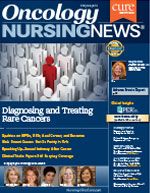What I Wish My Nurse Knew About Anal Cancer
I had anal cancer, and as a registered nurse with over 20 years of experience under my belt, this was unbelievable.
Michele Longabaugh, RN

Michele Longabaugh, RN
“You have anal cancer.” Six years after hearing those very words the whole diagnosis still sounds surreal to me. I had anal cancer, and as a registered nurse with over 20 years of experience under my belt, this was unbelievable. I had never even heard of anal cancer.
I soon learned that my cancer was defined as being quite rare. In my geographic area it was quite uncommon with only approximately 10 cases diagnosed per year. Needless to say, it was something that most of the healthcare providers treating me had rarely or never dealt with. Being on the other side of the stethoscope was a new and eye-opening experience for me as well, and the learning curve was steep.
I had no idea how isolating being diagnosed with a rare cancer could be. But that pales in comparison to the “solitary confinement” that a stigmatized cancer like anal cancer can carry.
So, your patient has anal cancer. I think there are a few key things that you can do that can make a tremendous difference. These involve treatment education, research opportunities, and connecting to support groups and resources. Don’t wait for your patient to ask, because they probably won’t. I didn’t.
The treatment regimen for anal cancer is brutal, involving simultaneous chemotherapy and pelvic radiation. Understanding the treatment challenges and side effects facing the patient with anal cancer, both short and long term, are important. Knowledge is power, so helping to educate patients and caregivers on what to expect and what the plan of action will be when the side effects occur only serves to benefit all involved.
This goes far beyond the nausea and vomiting that chemotherapy brings. It extends to skin care for radiation burns, bladder and bowel control both before and after treatments have concluded, diet intolerance and nutrition, pain management, and sexual dysfunction. Pelvic floor physical therapy plays a vital role in optimal recovery for patients early after anal cancer treatments have concluded.
We all know that research plays a valuable and critical role for cancer patients. Rare cancers like anal cancer do not have large volumes of research studies available. When faced with caring for less frequently seen cancers, take the opportunity to update yourself on what’s currently available and where it is being offered. Providing reliable information on larger centers that offer research studies for anal cancer patients is beneficial.
Finding local or virtual patient and family support resources was impossible for me in 2010. Things have changed for anal cancer since I first “googled” it and thankfully so, but support on the local level remains scarce. The squeamish nature of the anus alone is enough to silence even the most outgoing individual. Add to that the stigma that anal cancer carries and you have a recipe that compounds the isolation. Providing reliable anal cancer—specific support sources with active peer-to-peer programs can positively impact your patient. Having a safe forum in which to comfortably speak is imperative.
So, your patient has anal cancer… Arm yourself with knowledge and information and then share that openly with the patient and caregivers. Don’t wait for them to ask, because I know for a fact that they probably won’t. I didn’t.
Michele Longabaugh is a wife, mother of three children, registered nurse, and small business owner in the Midwest. In February 2010, she was diagnosed with stage IV anal cancer. She hopes to shatter the stigma and fight the loneliness that accompanies this devastating type of cancer. Follow her on Twitter at @CrazyAssCancer.
More Resources …
The HPV and Anal Cancer Foundation (AnalCancerFoundation.org) has excellent medical patient/caregiver resources and a peer-to peer-program, and blogforacure.com has a very active anal cancer forum.

Innovative Program Reduces Nurse Turnover and Fosters Development
Published: September 12th 2024 | Updated: September 12th 2024The US Oncology Network (The Network) has developed one of the most comprehensive programs in the nation to support the professional development and retention of new oncology nurses.


